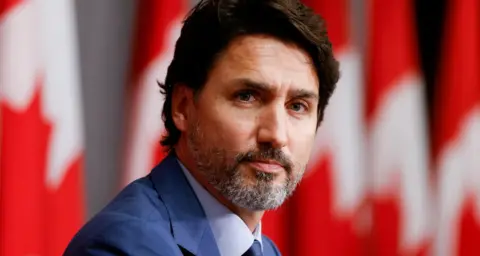Trudeau calls China's Hong Kong diplomacy 'coercive'
 Reuters
ReutersCanada's Prime Minister Justin Trudeau says he will not tolerate "coercive" diplomacy from China.
His remarks on Friday come a day after the Chinese ambassador warned that granting asylum to Hong Kong protesters could put Canadians in danger.
The envoy's comments were seen by many as a not-so veiled threat.
Relations between the two nations have been frosty since 2018, when two Canadians were detained in China over spying allegations.
This week, Beijing's envoy to Canada, Cong Peiwu explicitly told Canada not to accept asylum seekers from Hong Kong, calling them "violent criminals" in a video news conference.
"If the Canadian side really cares about stability and prosperity in Hong Kong, and really cares about the good health and safety of those 300,000 Canadian passport holders in Hong Kong and the large number of Canadian companies operating in Hong Kong … you should support those efforts to fight violent crimes," Mr Cong said.
When asked if his statement was a threat, Mr Cong said: "That is your interpretation."
Some leading Hong Kong protesters have fled for the West in recent months after the mainland authorities in Beijing passed a security law that reduces the city's autonomy and makes it easier to punish pro-democracy protesters.
Hong Kong, a former British colony, is part of China but enjoys unique freedoms as part of the conditions of its handover from the UK. Beijing says the new law will return stability to the city, but many Hong Kongers say it effectively curtails their right to protest and freedom of speech.
Mr Cong also threatened vague measures against Canada if the government were to pass a resolution condemning Beijing's treatment of Uighurs, a Muslim minority group who live largely in the Xinjiang region of northwest China.
The US sanctioned Chinese politicians over the summer. China is accused of mass detentions, religious persecution and forced sterilisation of Uighurs and others Muslims living in its far west.
In response, Mr Trudeau said he would not try and antagonise Beijing, but would not back down from protecting Canadian interests and standing up for human rights around the world.
"We don't look to escalate but we will continue to make sure Canadians know we stand for our rights and our values," he said.
Mr Trudeau's government has faced mounting pressure to repair relations with Beijing, nearly two years after the arrest of Michael Kovrig, a former diplomat, and Michael Spavor, a businessman.
Both have been charged with spying, but many believe the arrests were made in retaliation for the detention of Huawei executive Meng Wanzhou in Vancouver, at the request of the US.
She is currently fighting her extradition to the US, where she faces fraud charges, in court.
